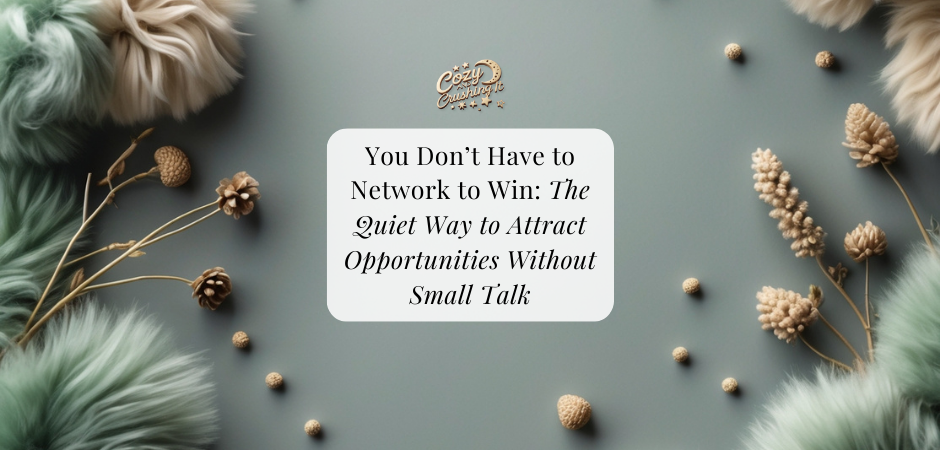
You Don’t Have to Network to Win: The Quiet Way to Attract Opportunities Without Small Talk
Let’s be honest: the phrase “you should network more” is the introvert’s version of “smile more.” It’s well-intentioned. But it’s also a little tone-deaf.
As a 30-year-old —proud introvert— I’ve spent my fair share of evenings dodging fluorescent-lit conference rooms and lukewarm wine at “must-attend” industry mixers. Spoiler: I didn’t miss out. In fact, I learned something much more powerful: You don’t have to network to win. You just need to make your work easier to find and harder to forget.
This piece is for my fellow quiet climbers—employees and entrepreneurs alike—who want to grow without performing extroversion. Let’s get into the art of opportunity attraction without the awkward icebreakers with these introvert networking strategies.
The Myth of the “Magic Connection”

Traditional networking culture sells the idea that one well-timed handshake can change your life. And sure, sometimes that happens. But for introverts, it often comes at the cost of days of energy depletion.
Research backs this up. A 2022 study published in the Journal of Vocational Behavior found that introverts experience higher levels of social fatigue in professional settings and often benefit more from asynchronous methods of visibility—think writing, deep work, and strategic referrals—than from constant in-person engagement.
Meet Jens: The Silent Star at the Office
Jens, 33, works in data analysis at a large tech company in Rotterdam. He’s soft-spoken, allergic to office politics, and avoids social mixers like they’re fire drills.
But earlier this year, he got promoted. Big time.
Why? His manager cited “consistently excellent work, documented results, and a clear ability to simplify complex problems.” But there’s more: Jens had quietly been sharing internal reports and tutorials that helped newer team members get up to speed. People started referencing his name in meetings—even when he wasn’t there.
No small talk. Just strategic visibility.
“I didn’t realize I was building a reputation,” Jens told me. “I just wanted to make people’s lives easier.”
Lesson? Quiet impact gets noticed—especially when it solves problems.
Visibility ≠ Volume
One of the most freeing realizations I’ve had—and seen in others—is that you don’t have to be everywhere to be known.
Take Noor, a 31-year-old freelance web designer and full-time introvert. She dreaded social media and couldn’t imagine attending a networking event without breaking into hives. So she did something else: after completing a few projects she was proud of, she simply asked her clients to recommend her to anyone they thought might benefit from her work.

She didn’t pitch. She didn’t post daily. She just asked for support.
Within weeks, she had a waitlist.
“I realized I didn’t need to ‘sell’ myself,” Noor said. “I just needed to be clear about the kind of work I wanted more of—and ask for it.”
That’s not networking. That’s alignment.
5 Quiet Ways to Attract Opportunities (Without Forcing Connection)
If the thought of traditional networking makes your stomach turn, try one of these introvert networking strategies instead:
1. Create a “proof of brilliance” trail.
Write articles. Share case studies. Document results. Build a quiet body of work that speaks before you enter the room.
2. Ask happy clients or colleagues for referrals.
Don’t overthink it. A simple “If you know someone who’d benefit from this, I’d love an intro” goes a long way.
3. Be findable online.
Have a simple portfolio, LinkedIn profile, or website that reflects your strengths. Introverts often underestimate how powerful passive discoverability can be.
4. Share knowledge internally.
Helpful emails, guides, or Loom videos within your team can quietly elevate your status.
5. Follow up one-on-one.
If you do meet someone interesting? Skip the follow-up coffee chat. A thoughtful email or DM is often more sustainable (and more appreciated) than another crowded lunch.
Soft Power Is Sustainable Power
The truth? People remember how you make them feel—and introverts have a superpower in making others feel heard, helped, or inspired through their work.
You don’t have to play the room. You just have to play your strengths.
And when you do, opportunities don’t need to be hunted down.
They start finding their way to you.


0 Comments